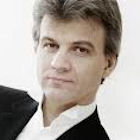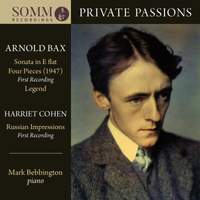Interview,
Mark Bebbington on Private Passions
 The British composer Arnold Bax is well-known to modern audiences, largely thanks to his evocative and Wagnerian tone-poem Tintagel. However, there's much more to him than his large-scale orchestral works; he also composed a considerable body of piano music. Pianist Mark Bebbington, who has often championed the works of British composers in the past (most recently Vaughan Williams, Bliss and Alwyn), now turns to Bax for his latest recording with Somm Records.
The British composer Arnold Bax is well-known to modern audiences, largely thanks to his evocative and Wagnerian tone-poem Tintagel. However, there's much more to him than his large-scale orchestral works; he also composed a considerable body of piano music. Pianist Mark Bebbington, who has often championed the works of British composers in the past (most recently Vaughan Williams, Bliss and Alwyn), now turns to Bax for his latest recording with Somm Records.
Even more fascinatingly, a suite by Harriet Cohen is also featured - Cohen made her career primarily as a concert pianist, but in her younger years had explored composition under Bax's tutelage. The two were lovers for many years and remained close until Bax's death; I spoke to Mark about the musical side of their relationship, and about Bax's piano music more generally.
Bax’s cultural interests ranged widely during his life, from Nordic to Slavic to Celtic (the last providing the inspiration for his most famous work, the orchestral tone-poem Tintagel). Do you hear any tinges of these “flavours” in the piano works on this recording?
Well, there are certainly Slavic overtones in the first movement of the E flat Sonata, but in a way that’s not saying that much, because there’s also a hint of Gershwin, too (the second movement of his Piano Concerto)! There is one delicious moment in the Sonata’s first movement - towards the end - when there’s a real Gershwin ‘blue’ chord...On the whole, though, I hear the language and writing of Liszt in much of the disc; the mingled violence, the dark and sultry romanticism of the big E flat Sonata does put me in mind of Liszt’s Dante Sonata.
As a musician Bax was notoriously reticent about performing in public; do you think this missed opportunity for self-promotion hurt his chances of broader popularity as a composer?
Not really. There are complex reasons for the present-day neglect of a composer such as Bax, but I think it’s fair to say that his piano works were fairly ‘out there’ during his life time (not least because of the assiduous devotion of Harriet Cohen). On a practical level, Bax’s piano scores remain generally fairly difficult to track down - and concert promoters are, of course, nervous of the box-office effect that less familiar repertoire will have. It’s not just the piano pieces that suffer; when was the last time one of Bax’s glorious symphonies was played at the South Bank or Barbican, or on any professional stage for that matter...?
Several of these works received their premieres in the 1980s around his centenary – The Four Pieces and Sonata in E flat in 1983, and In the Night in 1986. Do you think this has set in motion a more general subsequent revival of interest in his music?
I wish I could say that that were the case, but, as I’ve suggested above, I think the enthusiasm for Bax lies within the band of loyal followers! But we must fight on... ! Such wonderful music should not be allowed to languish in semi-obscurity. It’s odd in way, given the relatively wide attention paid to Bax’s piano music on disc over recent decades, that its presence in a recital programme is still a rarity.
By and large, Bax is mostly known today as an orchestral composer; do you think these piano pieces show a different musical language than that heard in his symphonic works?
I think, harmonically, he’s demonstrably the same composer. Even greater parallels can be drawn from the E flat Piano Sonata which went on to become the First Symphony where one can detect a symphonic procedure in the Sonata. Bax’s love of textural profusion - at times an almost orgy of sound - is a common denominator in his music, too. There’s an obsessive element in his music, as well, which I love; less in terms of a structural or motivic procedure, but more an emotional state. In In the Night for example, which features on the album, there is a nocturnal yearning that is almost palpable. Perhaps no composer was better at conveying the feelings of ecstasy and uncertainty that an illicit love affair brings...
The notes to this recording comment that Cohen’s last known work dates from 1921, when she was in her mid-20s (the Russian Impressions featured here are even earlier). Why do you think she stopped composing at such a relatively early age?
We can only conjecture why. Certainly Bax offered Harriet Cohen every encouragement, especially during the fledgling early period of their love affair. I suspect her growing international career as a pianist inhibited her composing career and then there’s always the barriers that a female composer would have encountered in the twenties and beyond. It’s frustrating, because she wrote more ambitiously than the atmospheric miniatures on the album, and yet not a trace of these scores can be found.....So it’s difficult to judge how good a composer she was and, therefore, how she might have developed.
Bax seems to have acted as something of a mentor to the young Cohen, certainly encouraging her and also exhorting her to refine her style. Do you hear any Baxian elements in Cohen’s own works?
I must say I can’t! For all of their simplicity, though, there is an emotional candour in these Cohen miniatures which I find very touching; emotional candour is very much Bax’s thing, too, so maybe there’s a subliminal link there.
Perhaps I can say that the Bax works on the album are the only solo piano works I have played of his. I have been so drawn into the rich and darkly Byronic world of these pieces that I look forward enormously to playing and recording a complete cycle of his piano music with Somm label. I know Siva Oke, founder and director of Somm, joins me in her wholehearted enthusiasm for this wonderful composer !
Private Passions was released on Somm on 1st February.
Available Formats: CD, MP3, FLAC, Hi-Res FLAC



